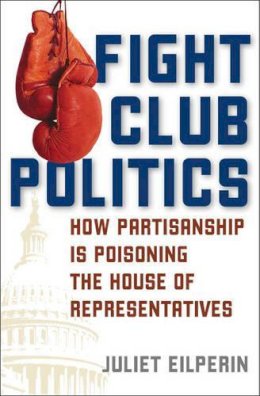14%OFF

Stock image for illustration purposes only - book cover, edition or condition may vary.
Fight Club Politics: How Partisanship is Poisoning the U.S. House of Representatives
Juliet Eilperin
€ 26.99
€ 23.18
FREE Delivery in Ireland
Description for Fight Club Politics: How Partisanship is Poisoning the U.S. House of Representatives
Hardback. The House of Representatives - the people's House - is supposed to most closely reflect the needs and desires of ordinary citizens. This title shows how we have come to the point where average Americans have little say over what happens in the House, and what can be done about it. Series: Hoover Studies in Politics, Economics, and Society. Num Pages: 192 pages, Illustrations. BIC Classification: 1KBB; JPL; JPQ. Category: (UU) Undergraduate. Dimension: 235 x 164 x 20. Weight in Grams: 399.
The function of the U.S. House of Representatives is to serve as the body of government closest to ordinary citizens, reflecting their needs and desires. Yet, over the past decade, the House's drift from its roots has given rise to Republicans' ability to capture control of the chamber from a 40-year Democratic rule. Factors including House rules that have curtailed dissent and more powerful party leaders perpetuate this national divide This book shows how average Americans have little say over what happens in the House, and what can be done about it.
The function of the U.S. House of Representatives is to serve as the body of government closest to ordinary citizens, reflecting their needs and desires. Yet, over the past decade, the House's drift from its roots has given rise to Republicans' ability to capture control of the chamber from a 40-year Democratic rule. Factors including House rules that have curtailed dissent and more powerful party leaders perpetuate this national divide This book shows how average Americans have little say over what happens in the House, and what can be done about it.
Product Details
Format
Hardback
Publication date
2006
Publisher
Rowman & Littlefield
Condition
New
Series
Hoover Studies in Politics, Economics, and Society
Number of Pages
192
Place of Publication
Lanham, MD, United States
ISBN
9780742551183
SKU
V9780742551183
Shipping Time
Usually ships in 15 to 20 working days
Ref
99-15
About Juliet Eilperin
Juliet Eilperin has been a Washington Post reporter since 1998. She was a contributor to Deadlock: The Inside Story of America's Closest Election (2001) about the 2000 presidential election. She lives in Washington, D.C., where she was born and raised.
Reviews for Fight Club Politics: How Partisanship is Poisoning the U.S. House of Representatives
Eilperin adds to our understanding of Congress, and as a short history of the House Fight Club Politics should be required reading for political-science students, news editors and reporters, as well as [political] junkies.
Jonathan E. Kaplan
The Hill
Partisanship and incivility are hardly novel phenomena in American politics. The new ingredient seems to be ideological polarization. ... Read more
Jonathan E. Kaplan
The Hill
Partisanship and incivility are hardly novel phenomena in American politics. The new ingredient seems to be ideological polarization. ... Read more
